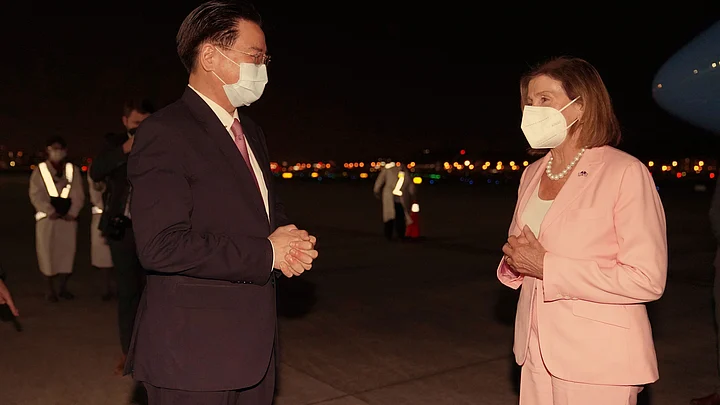Make no mistake: the visit of Nancy Pelosi, Speaker of the United States House of Representatives, to Taiwan on 2 and 3 August is not the primary reason behind China’s military intimidation of Taiwan. It is important to emphasise that congressional visits to Taiwan are common. United States’ serving officials have visited Taiwan in the recent past, too. In 2020, the then-United States State Secretary, Keith Krach, and the Health and Human Services (HHS) Secretary, Alex Azar, visited Taiwan. China did not respond strongly to such visits, but it is strongly reacting to Pelosi’s Taiwan visit.
In Taiwan, Pelosi did not mention 'forbidden' words, such as Taiwan’s ‘independence’; her statements were measured, primarily focused on Taiwan’s democratic resilience. The White House and even President Joe Biden, during his call with Xi Jinping, reiterated that the United States’ Taiwan policy has not changed. However, despite such reassurances, China reacted out of proportion.
US officials have visited Taiwan in the recent past, too. China did not respond as strongly to such visits as it has reacted to House Speaker Nancy Pelosi's visit.
Pelosi’s visit was neither a reason nor a trigger but was an excuse to intimidate Taiwan and use this opportunity to deter and dissuade countries from engaging with Taiwan further.
China’s ‘anger’ is not linked to just Pelosi’s visit but has been building up since 2016.
What China wants is for countries to isolate Taiwan and acknowledge that Chinese military actions are legitimate and valid.
Ahead of the 20th Party Congress later this year, China is looking for a reason to justify its military intimidation, grey zone tactics and the change in the status quo, so that Xi could show that he is fighting to safeguard China’s sovereignty
Some even linked China’s response to Pelosi’s visit to the gender of the Speaker. Pelosi, during her press conference with Taiwan’s President Tsai Ing-wen, remarked, “They [China] have a made a big fuss because I’m the speaker, I guess. I don’t know if that was a reason or an excuse. They did not say anything when the men came.” This was in reference to the past congressional visits that mainly consisted of male senators.
Why is China Angry?
Pelosi’s visit was neither a reason nor a trigger but was an excuse to intimidate Taiwan and use this opportunity to deter and dissuade countries from engaging with Taiwan further. China’s ‘anger’ is not linked to just Pelosi’s visit but has been building up since 2016. When Taiwan’s President Tsai Ing-wen assumed charge in 2016, the newly appointed government refused to accept the so-called 1992 Consensus and emphasised the self-determination of the Taiwanese people. In a 2021 article, Tsai remarked, “A fundamental part of the embrace of democracy is a firm belief that the future of Taiwan is to be decided by the Taiwanese through democratic means.”
What also angered China was the Tsai administration’s launching of the New Southbound Policy, which is a policy framework to diversify its foreign relations and engage Australia, New Zealand, and South and Southeast Asian countries. One of the major objectives has been to reduce overdependence on China by expanding the scope of its relations with other countries in the region.
Taiwan Is Getting Global Attention
China has been taking a number of punitive measures against Taiwan since 2016. One of the first steps was to keep Taiwan out of the World Health Assembly (WHA). Taiwan, which was a non-voting observer at the WHA from 2009 to 2016, was not invited to the 70th WHA in 2017 after the former refused to participate under the name of ‘Chinese Taipei’. Due to the Chinese pressure, even during the COVID-19 pandemic, Taiwan was kept out of all high-level discussions and had to deal with the pandemic on its own.
Despite its isolation, Taiwan became one of the few countries that handled the pandemic well. Its COVID-19 response was appreciated so much that comparisons between China and Taiwan’s COVID-19 responses began to gain prominence.
Developments relating to Taiwan and the international attention it has got in the past three years have frustrated the Chinese leadership. Before the onset of the pandemic, China was somewhat content with poaching Taiwan’s diplomatic allies and shrinking its international space. The unprecedented support from legislators and civil society from across the world has made China anxious and insecure, leading it to believe that it is losing its grip on the situation.
China Wants to Isolate Taiwan
What China wants is for countries to isolate Taiwan and acknowledge that Chinese military actions are legitimate and valid. Ahead of the 20th Party Congress later this year, China is looking for a reason to justify its military intimidation, grey zone tactics and the change in the status quo, so that Xi could show that he is fighting to safeguard China’s sovereignty. After all, Xi has to convince the domestic audience that he is worthy of the third presidential term.
This is China’s vengeance against Tsai, Taiwan, and its people, who have a desire to connect with the world and live freely without being alarmed by the looming China threat. Instead of China getting provoked, this should push liberal democracies to persuade China to stop the unjustified aggression.
(Sana Hashmi is Visiting Fellow at the Taiwan-Asia Exchange Foundation. She tweets @sanahashmi1. This is an opinion article and the views expressed are the author's own. The Quint neither endorses nor is responsible for them.)
